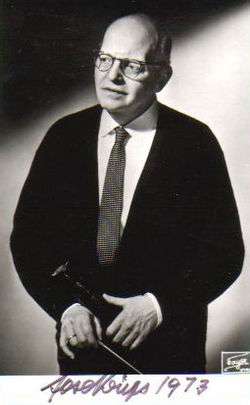Josef Krips

Josef Alois Krips (8 April 1902 – 13 October 1974) was an Austrian conductor and violinist.
Life and career
Krips was born in Vienna, and went on to become a pupil of Eusebius Mandyczewski and Felix Weingartner. From 1921 to 1924, he served as Weingartner's assistant at the Vienna Volksoper, and also as répétiteur and chorus master. He then conducted several orchestras, including in Karlsruhe from 1926 to 1933. In 1933 he returned to Vienna as a resident conductor of the Volksoper and a regular conductor at the Wiener Staatsoper. He was appointed professor at the Vienna Academy of Fine Arts in 1935, and conducted regularly at the Salzburg Festival between 1935 and 1938.
In 1938, the Nazi annexation of Austria (or Anschluss) forced Krips to leave the country. (He was raised a Roman Catholic, but would have been excluded from musical activity because his father was born Jewish.)[1] Krips moved to Belgrade, where he worked for a year with the Belgrade Opera and Philharmonic, until Yugoslavia also became involved in World War II. For the rest of the war, he worked in a food factory.
On his return to Austria at the end of the war in 1945 Krips was one of the few conductors allowed to perform, since he had not worked under the Nazi régime. He was the first to conduct the Vienna Philharmonic and the Salzburg Festival in the postwar period.
From 1950 to 1954, Krips was principal conductor of the London Symphony Orchestra. Afterwards, he led the Buffalo Philharmonic Orchestra and (from 1963 to 1970) the San Francisco Symphony. He made his Covent Garden debut in 1947 and his Metropolitan Opera in 1966, guest conducting frequently from then on. In 1970, he became conductor of the Deutsche Oper in Berlin. Between 1970 and 1973, he was the principal conductor of the Vienna Symphony.
He died at 72 in Geneva, Switzerland in 1974.[2]
His brother, Henry Krips, emigrated to Australia and was the chief conductor of the Adelaide Symphony Orchestra for a record 23 years (1949-1972).
Recordings
Krips's first recording was made for Odeon Records in Vienna on 13 January 1937, conducting the Orchestra of the Wiener Staatsoper in two Rossini numbers from the Bernhard Paumgartner operetta Rossini in Neapel, sung by Richard Tauber. Krips conducted the Vienna premiere of the work ten days earlier.
In 1950, Krips and the London Symphony Orchestra made a superb recording of Mozart's Symphony No. 41 (so-called "Jupiter" Symphony) (London LPS 86).
In 1955, Krips made a critically acclaimed recording of Mozart's Don Giovanni with the Vienna State Opera featuring Cesare Siepi, Fernando Corena, Walter Berry, Suzanne Danco, Lisa Della Casa and Hilde Gueden.
In 1957, Krips conducted the Symphony of the Air in stereo recordings of the five Beethoven piano concertos with Arthur Rubinstein for RCA Victor.
In 1960, Krips recorded Beethoven's nine symphonies for Everest Records. For this set of recordings, Krips conducted the London Symphony Orchestra, and for the Symphony No. 9, the soloists included Donald Bell, baritone, Jennifer Vyvyan, soprano, Rudolf Petrak, tenor, and Shirley Carter (later known as Shirley Verrett), mezzo-soprano. The BBC Chorus, under the chorusmaster Leslie Woodgate also performed. This series of recordings was popular with music critics and the public, and the recordings have been reissued several times in authorized and in bootleg editions.
During the 1970s, Krips recorded Mozart's late symphonies for Philips Records, conducting the Concertgebouw Orchestra. These have been reissued over the years by Philips and more recently by Decca.
Krips did not make any commercial recordings with the San Francisco Symphony, although many of his concerts were broadcast in stereo by San Francisco station KKHI.
References
External links
- Josef Krips at AllMusic
- Color photograph of Josef Krips conducting the Vienna Philharmonic
- Josef Krips' farewell letter to the Buffalo Philharmonic Orchestra